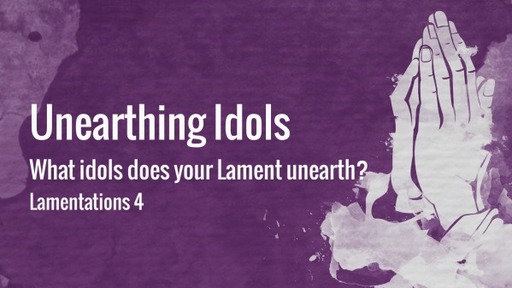Unearthing Idols

Notes
Transcript
Lament helped us to see the world and ourselves through a different lens. As we dove deep into this book, lament helped uncover some hidden idols.
Lamentations mourns the effects of suffering on a society, but not simply because of the loss. It is a memorial to the futility of trusting in anything but God.
Suffering bumps the beaker of our lives. It stirs up the sediments we forgot about or tried to hide. Fear, pride, covetousness, and self-sufficiency lie dormant. But pain can reveal these covert enemies. Hardship reveals idols.
What is an idol? It is anything more important to you than God, anything that absorbs your heart and imagination more than God, anything you seek to give you what only God can give. A counterfeit God is anything so central and essential to your life that, should you lose it, your life would feel hardly worth living. Timothy Keller
Idol of Financial Security
Idol of Financial Security
Lamentations 4 begins by lamenting the loss of the security and glory of Jerusalem’s wealth: How the gold has grown dim, how the pure gold is changed! (v. 1)
Money can be a common idol beneath the surface of our lives. Do you know its subtle captivity?
Lament penetrates the vault of our self-sufficiency and shows us the spiritual bankruptcy of trusting in financial security.
Suffering can also reveal a second object of misplaced trust: people. We can come face-to-face with how much we believe people can fix the problems around us.
Lament reminds us about the danger of putting too much hope in human leaders.
This is true at a personal level as well, including our closest relationships. Although a good friend can be helpful when you are walking through pain, he or she will never be able to bring complete healing to your heart. There’s a gap in your soul that no mere human can fill. Try
Remember, the first step in lament is turning to God— not to your closest relationships, and certainly not to yourself.
Idol of Cultural Comfort
Idol of Cultural Comfort
Prayers of lament can give us new eyes to see the true condition of our society. Rather than holding the groan of our culture at a distance or ignoring it altogether, lament has the potential to open our hearts to enter into the pain. It can topple the idol of wanting to live in Mayberry, an idealistic world insulated from the problems around us.
What are the cultural issues you tend to ignore? Perhaps you can take a few minutes in your next prayer time to join the groans of your neighbors or your city. Talk to God about the challenges of generational poverty, divorce, teen pregnancy, racism, unemployment, drug addiction, and any other social ill you can remember. As you read or watch the news, let it move you to lament rather than despair or disgust. Allow lament to soften your heart to the problems around you. Lament calls us not to ignore the cries of our culture.
Idol of Spiritual Leaders
Idol of Spiritual Leaders
13 This was for the sins of her prophets and the iniquities of her priests, who shed in the midst of her the blood of the righteous.
14 They wandered, blind, through the streets; they were so defiled with blood that no one was able to touch their garments.
The lost ground of spiritual authority might be regained if we were more careful to not idolize those in spiritual leadership and if spiritual leaders led in lament.
Leadership failure at any level is sobering. Lamentations 4 mourns the loss of spiritual authority, and it reminds us about the danger of resting upon the perceived spirituality of religious leaders. This lament invites us to recommit to faithfulness.
Presuming Divine Favor
Presuming Divine Favor
The final potential idol relates to the assumption of the blessing of God. No nation would have greater reason to claim a most-favored status than Israel. They were God’s chosen people.
I fear that too many of us, including myself, are so emotionally and spiritually tied to this optimism that we don’t know how to live in a culture reaping what it has sown.
Lament helps us to see the way believers persevered while living in a society rampant with idols. But it also allows us to search our own hearts for the ways those idols have invaded our lives as well.
Lament is the song you sing when divine blessing seems far away. Lamentations 4 helps us see the subtle idols that lie under the surface. Financial security, people, cultural comfort, spiritual leaders, or divine favor are just a few of the mini-gods that can capture our hearts. Losing them, in part or whole, presents an opportunity to be reminded where our affections should lie. Lamenting the toppling of our cultural idols can reorient Christian exiles as to what King and what kingdom we were supposed to long for.
The unearthing of idols is part of God’s plan. When pain topples our idols, lament invites self-examination. We can see more clearly the misplaced objects of trust that surface when the layers are peeled back. Pain helps us to see who we are and what we love.
Certainly we’ve not arrived. But in the process of wrestling with our exile, we are rediscovering the grace of lament. This ancient expression not only gives voice to our pain; it also becomes our teacher. Lament shows us how to think and what to pray when our idols become clear.
Vroegop, Mark. Dark Clouds, Deep Mercy (Kindle Locations 1927-1929). Crossway. Kindle Edition.